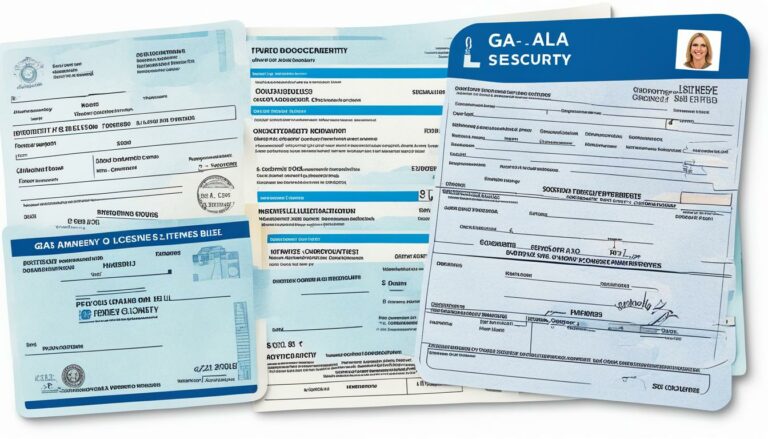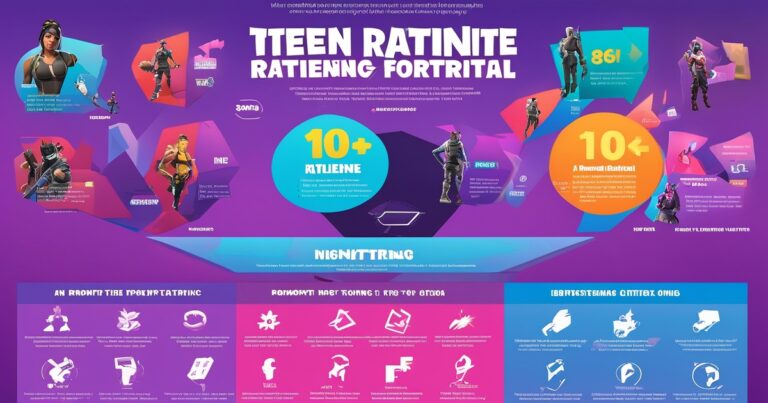Teen Driving Age Guide: When Can a Teenager Start?
Welcome to our comprehensive guide on the driving age requirements for teenagers in Texas. If you’re a parent or a teenager eagerly waiting to hit the road, it’s important to understand the legal driving age and the steps involved in obtaining a driver’s license. Let’s dive in and explore the age requirements for teen drivers in Texas!
Key Takeaways:
- Teenagers in Texas can start learning to drive at the age of 14 by enrolling in a driver’s education course.
- To be eligible for a learner license, they must wait until they are 15 years old.
- The Graduated Driver License Program in Texas ensures that teenagers go through various phases of driving privileges before earning a full, unrestricted license.
- Teenagers face certain restrictions while driving, especially during the GDL program phases, to ensure their safety and reduce the risk of accidents.
- Understanding and following the age requirements and restrictions is crucial for teen road safety.
Graduated Driver License Program in Texas
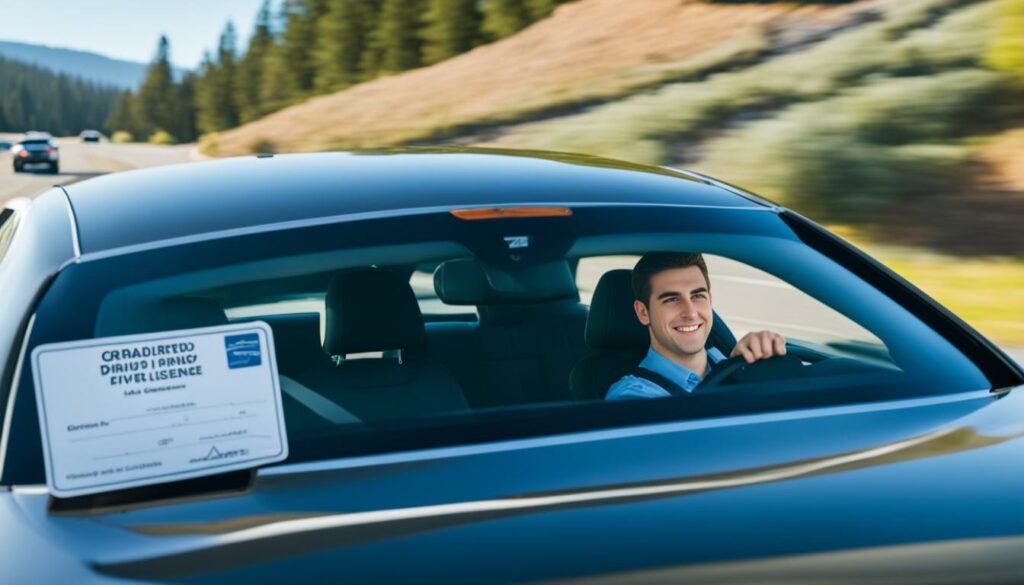
The Graduated Driver License Program, also known as the GDL Program, in Texas is designed to ensure that teenagers progress through different phases of driving privileges before earning a full, unrestricted license. This program plays a crucial role in preparing teenagers for the responsibilities of driving on their own and promoting safe driving practices.
Under the GDL Program, teenagers must fulfill specific time requirements for each phase in order to advance to the next level. This phased approach allows teenagers to gradually gain experience and confidence behind the wheel, reducing the risk of accidents and promoting responsible driving habits.
One of the major milestones in the program is obtaining a provisional license, which is the final phase before obtaining a full Texas driver’s license. To be eligible for an unrestricted license, the provisional license holder must reach 18 years of age without any major violations on their driving record.
By following the GDL Program and maintaining a good driving record, teenagers can expect to obtain their full Texas driver’s license by the time they turn 18 years old. This ensures that they have the necessary skills and experience to navigate the roads safely and responsibly.
To gain a better understanding of the phases and time requirements of the GDL Program, refer to the table below:
| Phase | Age Requirement | Time Requirement |
|---|---|---|
| Learner License | 15 years old | Minimum 6 months |
| Intermediate License | 16 years old | Minimum 6 months (after holding learner license) |
| Provisional License | 17 years old | Minimum 12 months (after holding intermediate license) |
| Unrestricted License | 18 years old | No major violations (after holding provisional license) |
The Graduated Driver License Program provides teenagers with the opportunity to develop their driving skills under supervised conditions, gradually advancing towards the privileges of a full Texas driver’s license. By following the program and adhering to the time requirements, teenagers can become safe and confident drivers, contributing to the overall safety of our roads.
Age Requirements for Teen Drivers in Texas
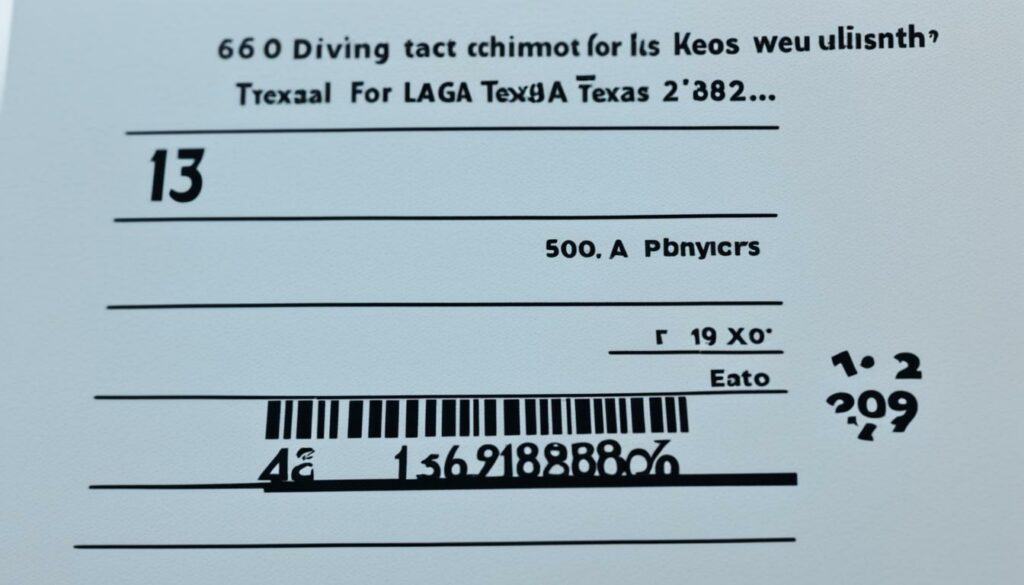
In Texas, there are specific age requirements for teenagers who want to obtain a driver’s license. These requirements ensure that young drivers have the necessary skills and experience to navigate the roads safely. Let’s take a closer look at the minimum age for teen drivers and the age requirements for obtaining a learner license.
Minimum Age for Teen Drivers
The minimum age for teen drivers in Texas is 15 years old. At this age, teenagers can begin the process of getting a learner license, which allows them to practice driving under the supervision of a licensed adult.
Age Requirements for Learner License
To obtain a learner license in Texas, teenagers must meet the following age requirements:
- Be at least 15 years old
- Have completed a driver’s education course
- Have a licensed adult who is 21 or older in the vehicle at all times while driving
Getting a learner license is an important first step for teenagers who want to learn how to drive. It allows them to gain valuable experience behind the wheel and develop their driving skills.
It’s worth noting that holding a learner license is a requirement for progressing to the next phase of the Graduated Driver License Program, which we will discuss in more detail in the next section.
Having a clear understanding of the age requirements for teen drivers in Texas is essential for both teenagers and their parents. By following these requirements, teenagers can embark on a safe and structured journey towards becoming responsible and confident drivers.
Time Requirements for Each Phase of the GDL Program
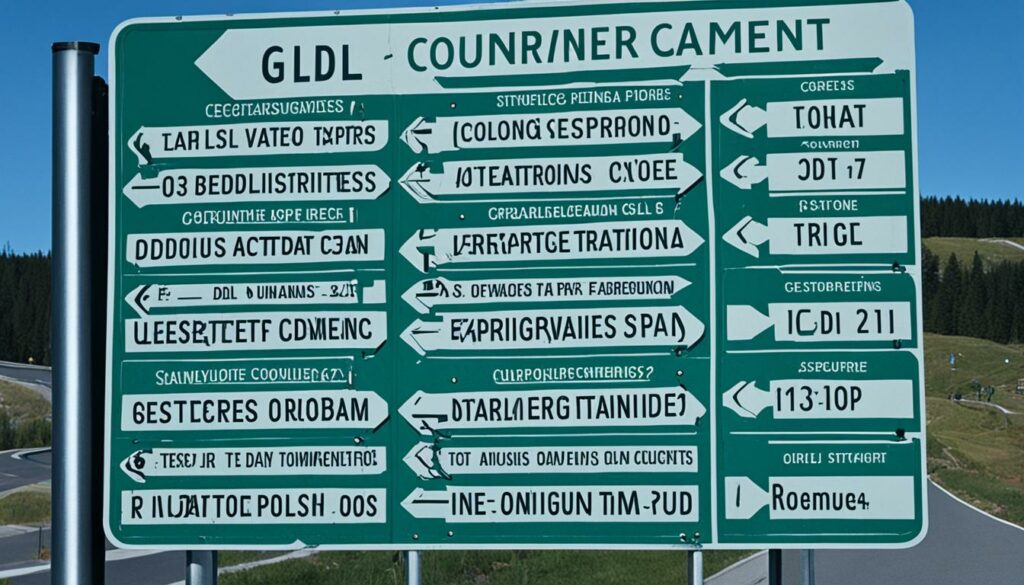
In order for teenagers in Texas to progress through the Graduated Driver License (GDL) Program, they must fulfill specific time requirements. These time requirements are crucial for ensuring that young drivers gain sufficient driving experience and develop responsible habits before obtaining an unrestricted license.
Here are the time requirements for each phase of the GDL Program:
- Learner License: Teenagers must hold a learner license for a minimum of 6 months. During this phase, they are required to practice driving under the supervision of a licensed adult who is 21 years or older.
- Intermediate License: After holding a learner license for 6 months and reaching the age of 16, teenagers can apply for an intermediate license. To qualify for the intermediate license, they must have completed the required driving practice hours and passed the driving skills test.
- Provisional License: To progress to the provisional license phase, teenagers must have held an intermediate license for at least one year without any road violations. This phase allows them to drive unsupervised but still comes with certain restrictions, such as passenger limitations and nighttime driving limitations. The provisional license phase is crucial for teenagers to gain more experience and adapt to independent driving.
- Unrestricted License: When a provisional license holder turns 18 years old without any major violations, they can obtain an unrestricted license. This marks the final phase of the GDL Program, granting teenagers complete driving privileges and the freedom to drive without the previous restrictions.
By adhering to the time requirements of each phase and continuing to develop safe driving skills, teenagers can progress through the GDL Program and ultimately obtain an unrestricted license.
Teen Driving Restrictions in Texas

Teenagers in Texas face specific driving restrictions, especially during the phases of the Graduated Driver License Program (GDL). These restrictions are put in place to ensure the safety of teen drivers and reduce the risk of accidents.
With a learner license, teenagers can only drive with a licensed adult who is 21 or older in the vehicle. This supervision helps teenagers gain experience and learn responsible driving habits. It ensures that they have guidance and support while on the road.
Once teenagers progress to a provisional license, there are additional restrictions to enhance their safety. These include:
- Having no more than one passenger under the age of 21 who is not a family member
- Not using wireless communication while driving, unless it’s an emergency
- Not driving between midnight and 5 a.m.
These restrictions aim to limit distractions, promote focused driving, and reduce the likelihood of dangerous situations on the road. By adhering to these restrictions, teenage drivers can develop good driving habits and prioritize safety.
“These restrictions aim to limit distractions, promote focused driving, and reduce the likelihood of dangerous situations on the road.”
The Importance of Teen Road Safety
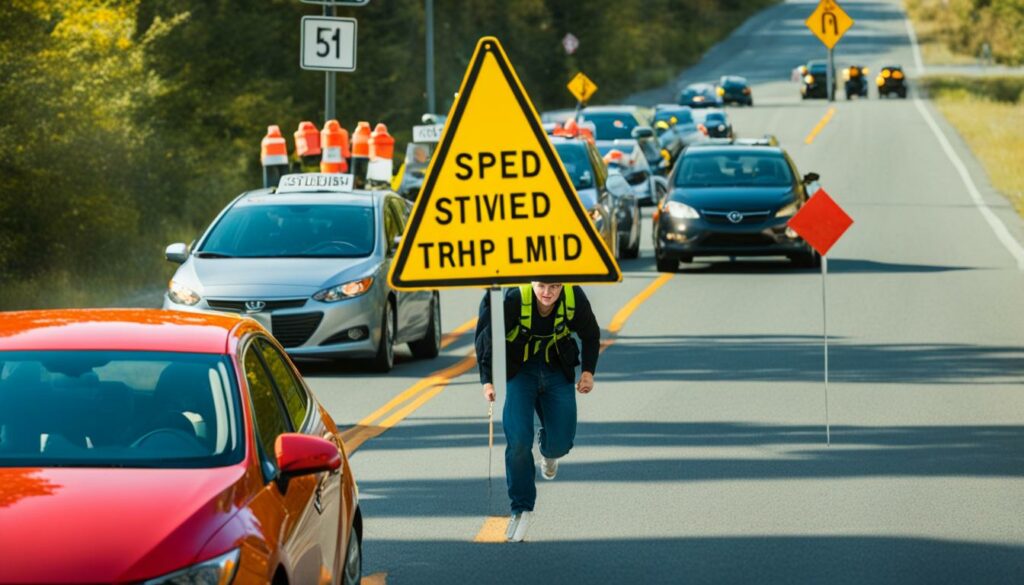
Teenagers have the highest crash rates during the first six months of unsupervised driving, highlighting the importance of prioritizing teen road safety. To address this issue, various restrictions are imposed on teen drivers to mitigate risky behavior and reduce the number of accidents involving teenage drivers.
By adhering to these restrictions and gaining valuable driving experience over time, teenagers can develop the necessary skills and become safer, more responsible drivers. It is crucial for both parents and teenagers to understand and respect these restrictions to ensure the well-being of young drivers and other road users.
| High Crash Rates for Teen Drivers | Restrictions on Teen Drivers |
|---|---|
| Teenagers are more prone to accidents within the first six months of obtaining their driver’s license. Inexperience, impulsivity, and a lack of awareness about potential risks contribute to the high crash rates among teen drivers. |
– Driving curfews: Teen drivers may face restrictions on nighttime driving to minimize the risk of accidents that are more likely to occur during late hours. – Passenger limitations: Limiting the number of passengers, particularly those who are not family members, reduces distractions and increases the focus on the road. – Cell phone usage restrictions: Teen drivers are often prohibited from using cell phones while driving, except for emergencies. |
Addressing Teen Road Safety Concerns
Understanding the high crash rates among teen drivers, it is essential to enforce driving restrictions that address potential risks and enhance road safety for both teens and other drivers. By implementing these restrictions, authorities aim to instill responsible driving habits and create a culture of safety on the roads.
Texas Teen Driving Laws and Penalties
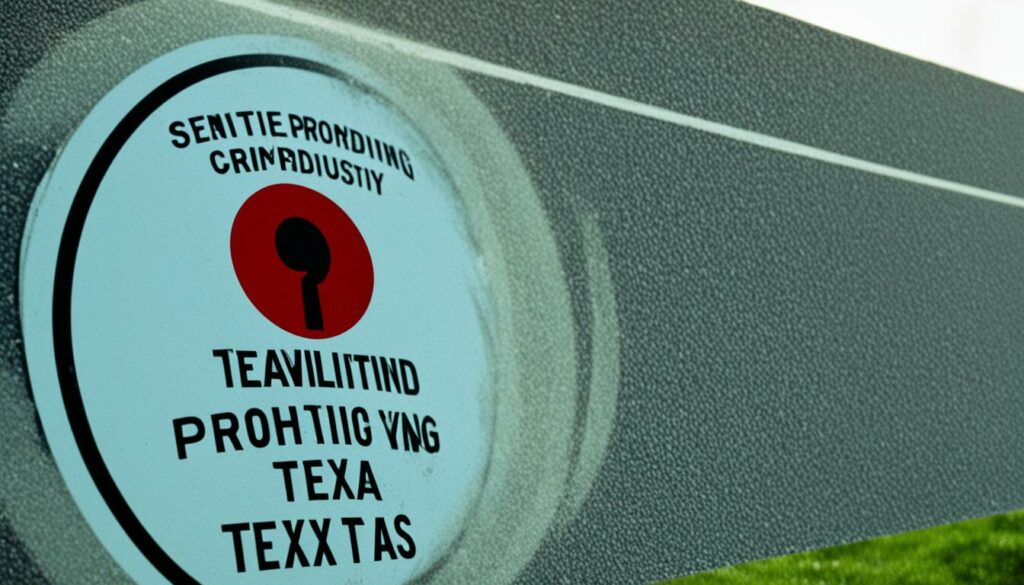
It’s crucial for both parents and teenagers to have a clear understanding of the driving laws in Texas and the potential penalties for violating them. Texas has implemented specific regulations targeting teenage drivers to improve road safety. Violations of these driving restrictions can result in fines or even license suspension. Additionally, Texas operates under a Zero Tolerance law for minors, making it a criminal offense for anyone under 21 to have any trace of alcohol in their system while driving.
Teenagers who fail to adhere to the driving restrictions or commit traffic offenses may face repercussions such as provisional license suspension or revocation. It’s important for teenagers to follow these rules to avoid legal consequences and ensure their own safety while on the road.
“The penalties for driving violations can have far-reaching consequences for teen drivers. Understanding and following the driving laws is essential to maintain a clean record and protect your driving privileges.”
By familiarizing themselves with the specific laws and regulations that apply to teenage drivers, both parents and teenagers can work together to promote responsible driving habits and reduce the risk of accidents.
Penalties for Violating Teen Driving Restrictions in Texas
| Violation | Penalty |
|---|---|
| Driving without a licensed adult while holding a learner license | Fine up to $200 |
| Driving with more than one passenger under the age of 21 while holding a provisional license | Fine up to $200 |
| Using wireless communication while driving (except for emergency purposes) while holding a provisional license | Fine up to $200 |
| Driving between midnight and 5 a.m. while holding a provisional license | Fine up to $200 |
| Violating any traffic offense while holding a provisional license | License suspension or revocation |
It’s essential for teenage drivers to adhere to these restrictions to avoid costly fines and potential loss of driving privileges. By doing so, they can foster a culture of responsible driving among their peers and contribute to overall road safety.
Different Types of Licenses for Texas Drivers
In Texas, drivers have different types of licenses available to them depending on their age and driving experience. Let’s take a closer look at each type of license:
Learner License
A learner license is the first step for teenagers in Texas who want to start driving. They can obtain a learner license at the age of 15 by completing a driver’s education course. With a learner license, teenagers can drive under the supervision of a licensed adult who is 21 or older. This allows them to gain driving experience while still being guided by an experienced driver.
Provisional License
Once teenagers turn 16 and have held a learner license for at least 6 months, they can apply for a provisional license. The provisional license comes with certain restrictions to ensure the safety of teenage drivers. For example, teenagers with a provisional license cannot have more than one passenger under the age of 21 who is not a family member. These restrictions are in place to minimize distractions and reduce the risk of accidents.
Adult License
When teenagers turn 18 in Texas, they are eligible to obtain an adult license, also known as a regular or unrestricted license. With an adult license, drivers have no specific restrictions and can enjoy the full privileges that come with being a licensed driver. However, it’s important to note that maintaining a good driving record and following all driving laws are essential for maintaining an adult license.
Here is a summary of the different types of licenses available for Texas drivers:
| Type of License | Age Requirement | Driving Restrictions |
|---|---|---|
| Learner License | 15 years old | Must be supervised by a licensed adult |
| Provisional License | 16 years old | Restrictions on passengers and nighttime driving |
| Adult License | 18 years old | No specific restrictions |
Understanding the different types of licenses for Texas drivers is crucial for both teenagers and their parents. It’s important to know the requirements and restrictions associated with each license to ensure a safe and responsible driving experience.
Chandler | Ross: Legal Support for Teen Driving Accidents
If you or your teenager have been involved in a car accident, Chandler | Ross is here to provide the legal support you need. Our experienced Car Accident Attorneys understand the complexities of teen driving accidents and are dedicated to fighting for the rights of those who have been injured.
At Chandler | Ross, we know that accidents involving teenage drivers can have serious consequences. Our team will thoroughly investigate the accident, gather all the necessary information, and build a strong case on your behalf. We strive to ensure that you receive the compensation you deserve for your accident injuries.
With offices located in Denton, Dallas, and Fort Worth, Texas, Chandler | Ross is well-positioned to provide skilled representation for car accident cases throughout the state. Our attorneys have extensive expertise in handling a wide range of accident claims, including those involving teen drivers.
When you choose Chandler | Ross, you can trust that you are working with compassionate and dedicated professionals who will guide you through the legal process. We are committed to helping you navigate the complexities of your case and providing you with the support and assistance you need.
Contact Chandler | Ross today to schedule a consultation and learn more about how our Car Accident Attorneys can assist you with your teen driving accident case.
Conclusion
In conclusion, understanding the teen driving age requirements in Texas is crucial for both teenagers and their parents. Teenagers can begin their driving journey at the age of 15 with a learner license, but they must go through the Graduated Driver License Program to obtain a full, unrestricted license. Each phase of the program has specific time requirements, allowing teenagers to gain the necessary experience and skills before progressing to the next phase.
Furthermore, driving restrictions are in place for teenage drivers to ensure their safety on the road. These restrictions, such as limiting the number of passengers and enforcing curfew hours, aim to reduce the risk of accidents during the learning process. By following these age requirements and restrictions, teenagers can become responsible and confident drivers.
However, accidents can still happen, and in such cases, legal support is essential. Chandler | Ross is available to provide professional assistance in case of teenage driving accidents. Their experienced team of Car Accident Attorneys can provide the necessary support to ensure that the rights of those injured in accidents involving teenage drivers are protected. Whether you are seeking compensation for accident injuries or legal representation, Chandler | Ross can guide you through the process and fight for your best interests.
By understanding the age requirements, following the driving laws, and being responsible, teenagers in Texas can navigate the process of obtaining a driver’s license and become safe and confident drivers on the road.
FAQ
When can a teenager start learning to drive in Texas?
Teenagers in Texas can start learning to drive at the age of 14 by enrolling in a driver’s education course. However, they must wait until they are 15 years old to be eligible for a learner license.
What is the Graduated Driver License Program in Texas?
The Graduated Driver License Program, also known as the GDL Program, is a phased program that allows teenagers to progress towards obtaining a full, unrestricted driver’s license. It has different phases with specific time requirements to fulfill.
What are the age requirements for teen drivers in Texas?
The minimum age for obtaining a learner license in Texas is 15 years old. To qualify for a provisional license, teenagers must be at least 16 years old and have held a learner license for at least 6 months. The unrestricted license can be obtained at 18 years old.
What are the time requirements for each phase of the GDL Program?
After holding a learner license for 6 months, teenagers can apply for an intermediate license. To qualify for a provisional license, they must have held an intermediate license for one year without any road violations. At 18 years old, without major violations, they can obtain an unrestricted license.
What are the driving restrictions for teenage drivers in Texas?
Teenagers with a learner license can only drive with a licensed adult who is 21 or older in the vehicle. With a provisional license, they are restricted from having more than one passenger under 21 who is not a family member, cannot use wireless communication while driving, and cannot drive between midnight and 5 a.m.
Why is teen road safety important?
Teenagers have the highest crash rates during the first six months of unsupervised driving. Driving restrictions are in place to prevent risky behavior and reduce accidents involving teenage drivers.
What are the driving laws and penalties for teenage drivers in Texas?
Teenagers who violate driving restrictions may face fines or license suspension in Texas. The state operates under a Zero Tolerance law for minors, making it a criminal offense for anyone under 21 to have any trace of alcohol in their system while driving. Violations can result in provisional license suspension or revocation.
What are the different types of licenses for Texas drivers?
Teenagers can start with a learner license at 15, then progress to a provisional license at 16. At 18, they can obtain an adult license without any restrictions, assuming they have followed the driving laws and maintained a good driving record.
Can Chandler | Ross provide legal support for teen driving accidents?
Chandler | Ross can provide legal support for car accident cases involving teenage drivers. Their experienced attorneys can investigate the accident, gather necessary information, and build a strong case to ensure that you receive the compensation you deserve.
What is the conclusion of the teen driving age requirements in Texas?
In Texas, teenagers can start learning to drive at 15 and progress through the Graduated Driver License Program to obtain a full, unrestricted license. It’s important for both parents and teenagers to understand the driving laws and restrictions to ensure teen road safety.





